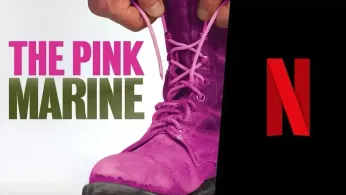
9 hours ago
From Boot Camp to Netflix: The Journey of "The Pink Marine" to "Boots"
READ TIME: 4 MIN.
In 2015, Greg Cope White published his memoir, "The Pink Marine: One Boy’s Journey Through Boot Camp to Manhood," chronicling an experience that was as harrowing as it was transformative. White, a gay teenager from Texas, decided to join the United States Marine Corps at the age of eighteen in 1979—an era long before policies such as “Don’t Ask, Don’t Tell” or any significant LGBTQ+ protections existed in the U.S. military. At the time, being openly gay was grounds for immediate expulsion, and the threat of violence or discrimination loomed large for anyone suspected of being part of the LGBTQ+ community .
White’s decision was spurred by the prospect of “summer” and “camp,” after his straight best friend Dale announced he was heading to boot camp at Parris Island. The reality was a grueling thirteen-week training designed to break and rebuild recruits, stripping away their civilian identities and forging them into Marines. For White, this also meant a constant fear of discovery, as being outed could have resulted in his discharge or worse .
Despite his fears and the ever-present threat of being found out, White’s memoir is infused with humor and resilience. He describes the oddball characters he met, the makeshift brotherhood that formed among recruits, and the universal struggle for acceptance—both from others and from oneself. The book highlights how everyone in boot camp feels “different” for one reason or another, and how these differences, though a source of vulnerability, can also serve as the foundation for unity and strength .
The journey from memoir to screen began when White, an established television writer, recognized the cinematic potential in his story’s blend of comedy, heartbreak, and cultural critique. The adaptation process required careful navigation to ensure the authenticity of his experience was preserved, especially the unique challenges faced by LGBTQ+ individuals in hyper-masculine spaces like the military .
White worked directly on the adaptation, ensuring that the voice of the protagonist—his younger self—remained true to the memoir’s spirit. He collaborated with producers and showrunners to balance the narrative’s humor with the underlying tension and danger of being gay in the military at that time. This process included translating the memoir’s internal monologues and nuanced perspectives into dialogue and dramatic scenes that would resonate with a broad Netflix audience while remaining honest to the source material .
The series, titled "Boots," was announced as a Netflix original, with the platform highlighting its unique perspective on masculinity, identity, and resilience. The adaptation underscores the comedy and absurdity of White’s initial naivety (“summer camp” vs. Marine boot camp) while confronting the very real dangers and isolation experienced by LGBTQ+ service members in the late 20th century .
The adaptation of "The Pink Marine" to "Boots" marks a significant moment in media representation for LGBTQ+ people, especially in stories involving the military—a domain traditionally marked by rigid gender norms and exclusionary policies. White’s memoir and its adaptation offer a rare, candid look at what it means to be queer in the armed forces, before policies like “Don’t Ask, Don’t Tell” provided even a modicum of protection .
The memoir and series both challenge the stereotype that military service and queerness are mutually exclusive. White’s story demonstrates not only the possibility of survival but also of thriving and finding camaraderie in unexpected places. The narrative’s humor and vulnerability allow for a more nuanced exploration of masculinity and belonging, countering one-dimensional depictions of both military life and LGBTQ+ identity .
By centering the story on its protagonist’s internal and external struggles with acceptance, "Boots" opens the door for broader conversations about inclusion in the military, the legacy of homophobic policies, and the ongoing fight for equality and visibility for LGBTQ+ people in all walks of life. The series arrives at a time when debates about transgender military service and broader LGBTQ+ rights remain at the forefront of public discourse—making its impact both timely and resonant .
The response to both the memoir and its Netflix adaptation has been marked by praise for their candor, wit, and emotional depth. Early reviews of the memoir cited White’s ability to blend comedy with poignant social commentary, providing insight into the unique pressures faced by LGBTQ+ individuals in hostile environments .
The Netflix series "Boots," by virtue of streaming to a global audience, has the potential to reach viewers who may have never encountered such a story. Its release has been positioned as a milestone in LGBTQ+ storytelling, not only for its subject matter but for the active involvement of its original author in the adaptation process—a rarity in Hollywood .
White has spoken publicly about the importance of authentic representation and the impact that sharing vulnerable, lived experiences can have, especially for young LGBTQ+ people who may be searching for their place in the world. His journey from a frightened recruit to a Marine—and now to a Netflix screenwriter and advocate—underscores the evolving landscape of LGBTQ+ visibility and the power of storytelling to foster empathy and understanding .
As "Boots" continues to garner attention, its legacy will likely be measured not only in viewership but in its ability to inspire conversations about acceptance, courage, and the ongoing challenges faced by LGBTQ+ people in society and the military.






